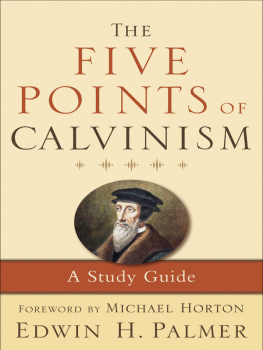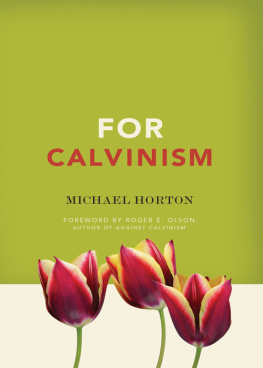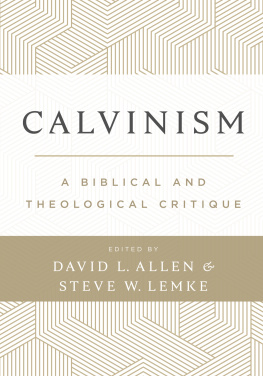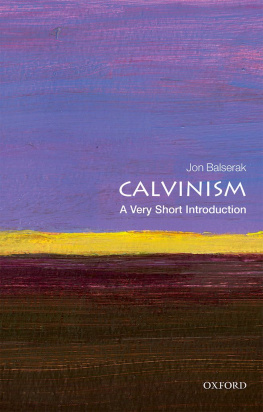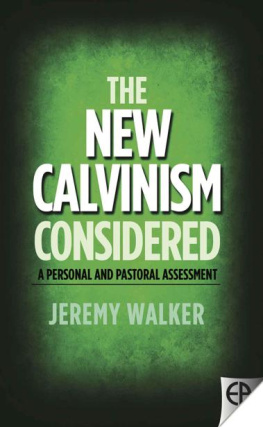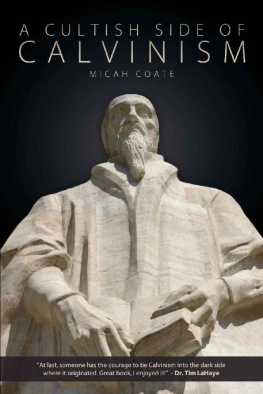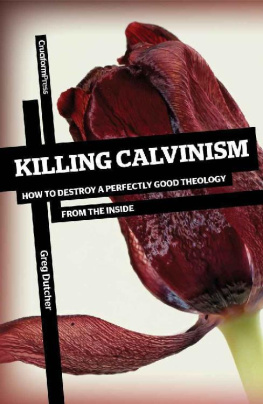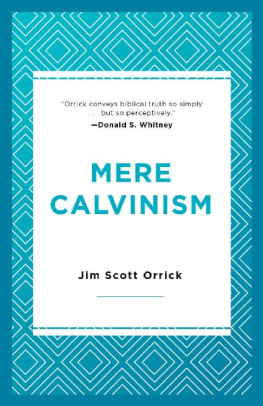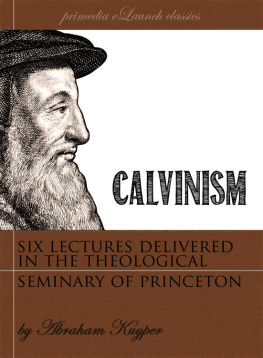Edwin H. Palmer - The Five Points of Calvinism: A Study Guide
Here you can read online Edwin H. Palmer - The Five Points of Calvinism: A Study Guide full text of the book (entire story) in english for free. Download pdf and epub, get meaning, cover and reviews about this ebook. year: 1996, publisher: Baker Publishing Group, genre: Religion. Description of the work, (preface) as well as reviews are available. Best literature library LitArk.com created for fans of good reading and offers a wide selection of genres:
Romance novel
Science fiction
Adventure
Detective
Science
History
Home and family
Prose
Art
Politics
Computer
Non-fiction
Religion
Business
Children
Humor
Choose a favorite category and find really read worthwhile books. Enjoy immersion in the world of imagination, feel the emotions of the characters or learn something new for yourself, make an fascinating discovery.
- Book:The Five Points of Calvinism: A Study Guide
- Author:
- Publisher:Baker Publishing Group
- Genre:
- Year:1996
- Rating:4 / 5
- Favourites:Add to favourites
- Your mark:
- 80
- 1
- 2
- 3
- 4
- 5
The Five Points of Calvinism: A Study Guide: summary, description and annotation
We offer to read an annotation, description, summary or preface (depends on what the author of the book "The Five Points of Calvinism: A Study Guide" wrote himself). If you haven't found the necessary information about the book — write in the comments, we will try to find it.
The Five Points of Calvinism: A Study Guide — read online for free the complete book (whole text) full work
Below is the text of the book, divided by pages. System saving the place of the last page read, allows you to conveniently read the book "The Five Points of Calvinism: A Study Guide" online for free, without having to search again every time where you left off. Put a bookmark, and you can go to the page where you finished reading at any time.
Font size:
Interval:
Bookmark:
THE
FIVE
POINTS OF
CALVINISM
THE
FIVE
POINTS OF
CALVINISM

A Study Guide
EDWIN H. PALMER

1972 by Baker Books
Published by Baker Books
a division of Baker Publishing Group
P.O. Box 6287, Grand Rapids, MI 49516-6287
www.bakerbooks.com
New paperback edition published 2010
ISBN 978-0-8010-7244-4
Previously published in 1980
Printed in the United States of America
All rights reserved. No part of this publication may be reproduced, stored in a retrieval system, or transmitted in any form or by any meansfor example, electronic, photocopy, recordingwithout the prior written permission of the publisher. The only exception is brief quotations in printed reviews.
Library of Congress Cataloging-in-Publication Data
Palmer, Edwin H.
The five points of Calvinism : a study guide / Edwin H. Palmer. New pbk. ed.
p. cm.
Includes bibliographical references.
ISBN 978-0-8010-7244-4 (pbk.)
1. CalvinismTextbooks. I. Title.
BX9422.3.P35 2010
230'.42dc22
2009045597
10 11 12 13 14 15 16 7 6 5 4 3 2 1

Contents
I n 2009, Time magazine listed The New Calvinism among the top ten movements changing the world today. Across the denominational landscape, there is an obvious trend among younger Christians toward doctrines that many historians regarded as no longer viable in a democratic, individualistic, and pull-yourselves-up-by-your-own bootstraps kind of society.
What is the attraction? According to many testimonies, it is a grand view of God and his saving grace in Jesus Christ. These Christians often relate that they were reared in a spiritual environment aptly characterized by the title of J. B. Phillips little book, Your God Is Too Small. They are overwhelmed with the God-centered orientation of the Scriptures, which challenges the human-centered preoccupations that seem to characterize much of popular worship, preaching, and evangelism.
Whatever impressive gains that we can see today for the doctrines of graceotherwise known as the five points of Calvinismare the fruit of patient sowing of seeds by faithful pastors who never lived to see the full flowering of their labors. Surely Edwin Palmer deserves a place at the top of that list, for the introduction that you hold in your hands.
I read this book as a teenager who, like many today, was searching for a fuller understanding of Christian faith and practice that is found in Scripture. It was one of those books that was always recommended by the likes of James Boice, J. I. Packer, and R. C. Sproul. Today, there are many introductions to these truths, but Palmers remains unsurpassed for its clarity, brevity, and the simplicity of its exegetical insight. He does not engage in caricatures of rival views, but concentrates on the biblical arguments and pastoral implications.
The great church father Augustine tells the story of his conversion through hearing a boy next door singing, Take up and read. Lying on Augustines table was Pauls Epistle to the Romans and he took this as an invitation to read through the apostles famous letter. The rest is history. Short of picking up Romans itself, I can think of no better place to begin than this classic exploration of Gods sovereign grace in the salvation of sinners.
Michael Horton
Westminster Seminary California
T he title The Five Points of Calvinism can be misleading. For Calvinism does not have five points; and, neither is Calvin the author of the five points.
First of all, Calvinism is not restricted to five points; it has thousands of points. The first word that Calvinism suggests to most people is predestination; and if they have a modicum of theological knowledge, the other four points follow. But this is wrong. Calvinism is much broader than five points. It is not even primarily concerned with the five points. In the first catechism which Calvin drew up (1537), predestination is only briefly mentioned. In the Confession of Faith, drawn up in the same year, there is no mention of it at all. In another catechism and four confessions attributed to Calvin, the doctrine is mentioned only in passing. And in the first edition of his monumental work, The Institutes, it is given no important place even when he treats the matter of salvation. It was only in later editions, after attacks had been made on the grace of God, that he enlarged upon predestination.
Calvinism has an unlimited number of points: it is as broad as the Bible. Does the Bible teach about the Trinity? Then Calvinism does. Does the Bible deal with the deity of Christ, the covenant of grace, justification by faith, sanctification, the second coming of Christ, the inerrancy of Scripture and the world-and-life view? Then, Calvinism does, too. For John Calvins goal in his preaching, teaching, and writing was to expound all the Word of Godand the Word of God alone. Scriptura tota: Scriptura sola. Calvinism is an attempt to express all the Bible and only the Bible. To restrict it to five points is to misjudge and dishonor the man and movement that bears the name Calvin.
Not only can the word five be misleading in the name TheFive Points of Calvinism, but also the word Calvinism. At first glance, many believe that Calvin is the author of the five points.
Such a misconception ignores the fact that Calvin simply expounded the Bible. Calvin did not invent a new teaching any more than Columbus invented America or Newton the law of gravity. As Columbus and Newton merely discovered what had existed all along, so Calvin uncovered truths that had been in the Bible all the time. And Calvin was not the first nor the last to uncover these biblical truths. Many others confessed them, too. From Augustine to Gottschalk to Spurgeon; from Lutherans to Baptists to Dominicans; from Dutch to Scottish to French; from individuals to associations to church confessions; from laymen to hymn-writers to theologians. The name Calvinism has often been used, not because Calvin was the first or sole teacher, but because after the long silence of the Middle Ages, he was the most eloquent and systematic expositor of these truths. To the novitiate, however, it seemed as if Calvin originated them.
It is these truths of the sovereign grace of God that are dealt with in this booklet. One easy way to remember them is by the memory-crutch TULIP; Total depravity, Unconditional election, Limited atonement, Irresistible grace, and Perseverance of the saints.
1
Total Depravity
S ince there are so many misconceptions concerning total depravity, it is necessary first of all to state what the doctrine is not; and then, second, to state what it is.
1. What It Is Not
A. It is not absolute depravity
Sometimes the word depravity coupled with the word total gives the impression that man is as bad as possibleas evil as he can be, somewhat like the devil.
But total depravity is not the same as absolute depravity. Absolute depravity means that a person expresses his depravity to the nth degree at all times. Not only are all of his thoughts, words, and deeds sinful, but they are as vicious as possible. To be totally depraved, however, does not mean that a person is as intensively evil as possible, but as extensively evil as possible. It is not that he cannot commit a worse crime; rather, it is that nothing that he does is good. Evil pervades every faculty of his soul and every sphere of his life. He is unable to do a single thing that is good.
Next pageFont size:
Interval:
Bookmark:
Similar books «The Five Points of Calvinism: A Study Guide»
Look at similar books to The Five Points of Calvinism: A Study Guide. We have selected literature similar in name and meaning in the hope of providing readers with more options to find new, interesting, not yet read works.
Discussion, reviews of the book The Five Points of Calvinism: A Study Guide and just readers' own opinions. Leave your comments, write what you think about the work, its meaning or the main characters. Specify what exactly you liked and what you didn't like, and why you think so.

